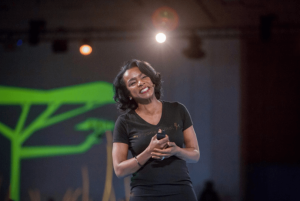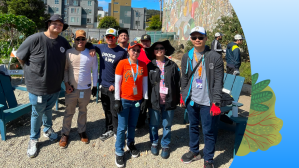Leah McGowen-Hare is Senior Director of Developer Evangelism at Salesforce. In her two decades in technology she has worked as a developer, technical trainer, and consultant, among other roles, and she is a champion for equality and volunteers with Black Girls Code, Girls Who Code, Vetforce, Girl Scouts and other organizations. Leah is also a lifelong advocate for fitness and author of a children’s book titled Charlie the Hotdog.
Leah works closely with Salesforce’s Trailhead online learning program, which has a new program called Be a Multiplier, designed to give anyone the resources to host a Trailhead workshop at work, in their community, or elsewhere. In the following interview Leah shares her thoughts on Trailhead and her equality work.
How many students have you taught to code on Salesforce over the past nine years? What’s the largest class you’ve taught?
I’ve taught more than 13,000 students to code over the past 11 years in classes as small as 2, and as large as 250. And I’ve presented to audiences as large as 10,000. You never know who you have the chance to inspire, so I always try to bring my best.
There are more than 300,000 job postings that seek Salesforce skills. How can people learn the skills to land these jobs?
Technology-related jobs in general are in demand, and the demand for Salesforce skills has never been higher. According to an IDC report, Salesforce and its ecosystem of partners and customers will create 3.3 million new jobs worldwide by the year 2022. Indeed, one of the leading job sites, found that 2 of the top 10 jobs in 2017 were related to Salesforce: #4 Salesforce Administrator and #6 Salesforce Developer. Trailhead, our free online learning tool, is a great way to learn Salesforce skills as well as other topics, such as Cultivating Equality at Work. It makes learning fun with guided learning paths that help people “skill up” on the latest technology to be more marketable for competitive career opportunities. We also prioritize university recruitment, computer science curriculum in K-12 schools and training for veterans and their spouses.
Women, Latinos, and African Americans are greatly underrepresented in the technology workforce. Is Salesforce training on Trailhead an effective way to address these disparities?
Trailhead is a great tool to address disparities because it’s so inclusive. Trailhead’s mission is to provide an accessible forum for everyone to learn the latest technology. Women, people of color, veterans, anyone who wants to be part of the workforce of the future. They need access, information and knowledge to land the job that sparks the career that creates opportunity in the new economy. Trailhead is free, all you need is Internet access. What’s more equitable than free?
We’re proud that Fortune has named Salesforce one of the best workplaces for diversity, and equality is one of our core values. There is much more work to do, and as a company I think we acknowledge that and dig into that challenge.
Trailhead has a new program called Be a Multiplier. Can you tell us a bit about it?
BAM – Be a Multiplier. It’s a program giving anyone what they need to host a Trailhead workshop at their job, in their community, with their family! There is a huge opportunity to have an impact sharing Salesforce knowledge powered by Trailhead. If you teach 10 friends Salesforce skills, and they teach 10 others, and so on, we can reach millions of people and help champion equality for all in technology.
Is it true you tell a story about the movie “Hidden Figures” in conference keynotes? What is it?
There’s a scene in “Hidden Figures” when Janelle Monáe’s character’s supervisor tells her that there’s an engineer position she should apply for. She quickly responds to him that she can’t apply because she’s female and black. He states that she has exactly what it takes to be an engineer. Where she saw limitations, he saw potential – not color, or gender, or societal norms. He saw her in a bigger vision for her than she saw for herself. She saw herself in a limited view due to what society said she could and could not do. It took her supervisor, a (foreign-born male) who did not see her through the narrow lens of society. He was pivotal in helping this character see herself through a broader lens.
I have learned through my own journey in business and life that you need to surround yourself with people who see you through a wider lens. When I was teaching developers how to code as a technical trainer, I thought that was what I was supposed to do. An executive helped me see that I could be successful helping to evangelize the platform to larger audiences. It took me a minute to see myself beyond my own limited perspective. It took feedback for me to appreciate and capitalize on what was hidden within me. I didn’t appreciate my own potential, principally because I didn’t see myself reflected in the people who dominated public platforms. For that reason, I hope everyone can see themselves reflected in me and other Salesforce leaders.















